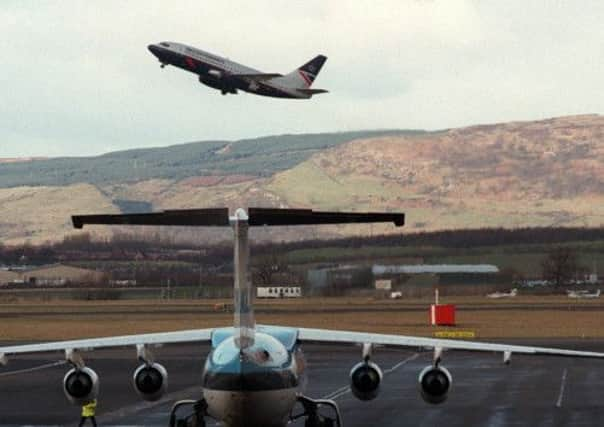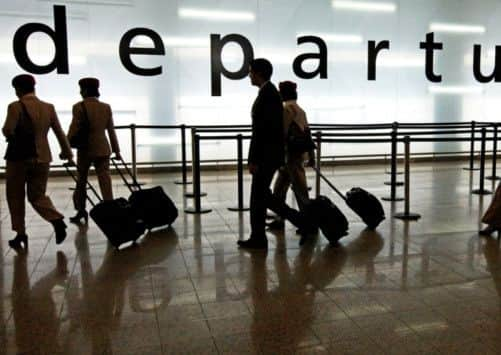The soaring importance of aviation in Scotland
This article contains affiliate links. We may earn a small commission on items purchased through this article, but that does not affect our editorial judgement.


Aviation plays a critical role in supporting the growth of the UK economy and this role is even more profound in Scotland, given the country’s location on the periphery of Europe.
Travelling by air is not a luxury, but an essential element of business and family life, and our ability to enhance Scotland’s global competitiveness is dependent on having air links with established and emerging markets.
Advertisement
Hide AdAdvertisement
Hide AdEconomist Dr Irwin Stelzer said “commerce follows connectivity, or at least is closely related to it”, and that is why, together with our city and national partners, we go to great lengths to further strengthen Glasgow’s and Scotland’s route network.


Route development will always be a top priority for Glasgow Airport and I’m pleased to say we have achieved a great deal of success in recent years.
Growth
Having endured the worst downturn in aviation history, we have provided a greater choice of services and maintained a pattern of consistent passenger growth which has stretched back to January 2011.
Routes such as Emirates’ double daily service to Dubai have not only contributed to the steady increase in passenger numbers, they have played an important role in encouraging export-led growth, attracting inward investment and supporting Scotland’s tourism industry.
We actively seek direct links with as many worldwide destinations as possible, including a diverse range of hub airports throughout Europe and beyond.
However, due to the size of the market in Scotland, it can be difficult to attain and sustain new routes. Our efforts are further compounded by the higher operating costs airlines incur by flying longer distances to Scotland and the increasing burden of Air Passenger Duty (APD), which dissuades airlines from basing aircraft here.
APD has received numerous column inches in recent months and I don’t want to labour the point, but we really cannot underestimate the impact of this damaging tax. The World Economic Forum recently placed the UK 139th out of 140 countries in terms of tourism competitiveness with respect to air taxes and charges.
APD has a detrimental effect on UK businesses and the economy in general. This has been supported by findings from a number of independent reports; one, by York Aviation, found that APD cost Scotland over two million passengers per annum and will cost the Scottish economy up to £210 million in lost tourism spend per annum by 2016.
Holidays
Advertisement
Hide AdAdvertisement
Hide AdWe must not lose sight of the significant impact APD has on Scottish families wishing to travel abroad on their annual holiday. For example, a family of four travelling to Florida for a holiday prior to 2007 would have paid £80 in APD for their trip. In summer 2012, for the same trip, they would have paid £260.
In Scotland, our politicians appreciate the role aviation plays in supporting the growth of the economy and there appears to be broad cross-party support for action on APD. That is why we will work together with elected representatives to lobby the UK Treasury and ensure it also recognises Scotland’s unique reliance on aviation.
Whilst we will continue to draw attention to what we believe are serious policy deficiencies, we will also ensure Glasgow Airport is able to meet the requirements of modern aviation and is in a position to take advantage of any opportunities to strengthen Scotland’s links with the world. We have invested heavily in the airport in recent years and have plans in place to further improve the infrastructure capable of serving long haul destinations.
We are investing £17 million in refurbishing and enhancing key parts of the main terminal building, including international arrivals which for many will be the gateway to the 2014 Commonwealth Games. The investment includes the modernisation of our check-in hall and a series of airside developments such as the installation of state-of-the-art energy efficient LED lighting in our taxiways.
In July we reached a significant milestone with the unveiling of our new brand. For many, Glasgow Airport is their first and last impression of Scotland and the concept of the new brand centred on creating a “Sense of Place” and reinforcing our commitment to delivering unrivalled customer service.
The eyes of the world will fall on Scotland during 2014 when we will host the Commonwealth Games, Ryder Cup and Homecoming and we are acutely aware of the role we have to play in creating the right image for the airport – and perhaps more importantly, for Scotland.
• Amanda McMillan is managing director, Glasgow Airport www.glasgowairport.com
Twitter: @GLA_Airport